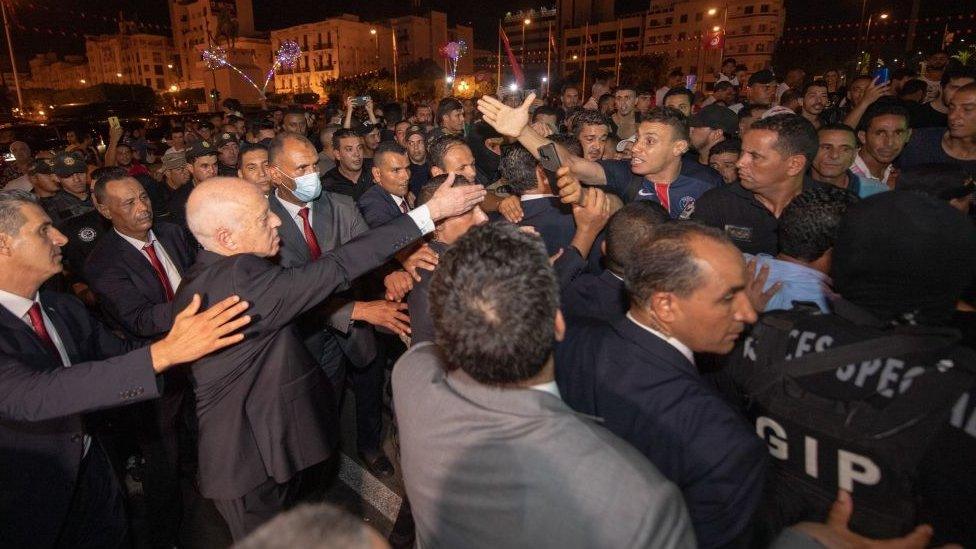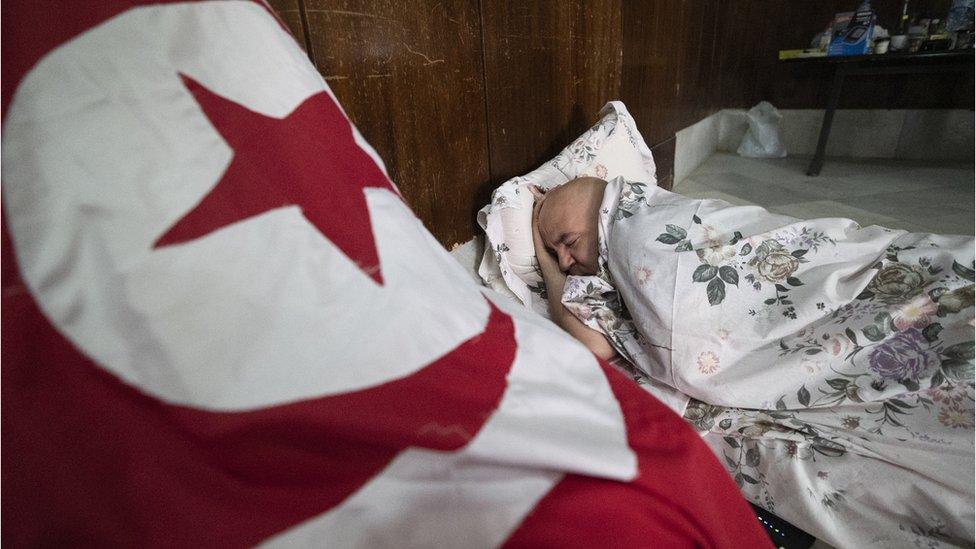Tunisia referendum: Voters give president near unchecked power
- Published

Tunisian President Kais Saied celebrates with his supporters after Monday's vote
Tunisia has voted to hand sweeping new powers to the country's president, in a move that critics say risks the return of authoritarian rule to the country.
Fewer than a third of Tunisians voted in the referendum, with 94.6% of those balloted supporting plans to hand President Kais Saied broad new powers.
But opposition groups, who boycotted the vote, said the results were "not credible" and "inflated".
Mr Saied has claimed the changes will break Tunisia's political paralysis.
The 64-year-old has already been ruling by decree since this time last year, when he dramatically moved to suspend parliament and dismiss the government.
Tunisia's new constitution would give the head of state full executive control, supreme command of the army and the ability to appoint a government without parliamentary approval.
It would also weaken Tunisia's judiciary and remove checks on the powers of the presidency.
Mr Saied's political rivals accused the country's electoral board of "fraud" and said they would not recognise the newly approved constitution - which is expected to come into force when the final poll results are published.
Mr Saied and the Tunisian electoral commission have yet to comment on the accusations.
Critics fear the new constitution will codify the president's newly-acquired authority, reducing the constraints on his personal powers and eroding the country's relatively young democracy.
"Saied falsified the popular will by falsifying the results," said Nejib Chebbi, head of the opposition National Salvation Front. He added that the initial results were "inflated and don't fit with what observers saw on the ground".
Many supported the changes in the hope that the new constitution would mark a new chapter, freeing Tunisia from the political bickering and government paralysis and reducing the influence of the country's largest Islamist party.
Speaking after the vote on Tuesday, Mr Saied told supporters that "Tunisia has entered a new phase" and pledged that "all those who have committed crimes against the country will be held accountable for their actions".
Monday's poll saw just 30.5% of eligible voters casting a ballot, according to early official figures.
But Mr Saied claimed that "there was a large crowd in the polling stations and the rate would have been higher if the vote took place over two days".
The referendum saw the lowest turnout in any of five major votes held in Tunisia since 2011, when the country overthrew its long-serving ruler Zine al-Abidine Ben Ali and became the birthplace of the Arab Spring that then swept across the Middle East.
Until recently, Tunisia was the only nation considered to have emerged from the uprisings as a democracy.
President Saied said his reforms were being enacted in the spirit of that 2011 revolution, safeguarding Tunisia's future and ending years of economic decay.
"Our money and our wealth are enormous, and our will is even greater, to rebuild a new Tunisia and a new republic, one that breaks with the past," the president said after voting on Monday morning.
An independent politician without the support of one political party, Mr Saied retains broad support among a broad section of Tunisians who believe the country needs a strong leader to address its problems.
However, there seemed little enthusiasm for the referendum.
You might also be interested in:
Tunisia referendum: A nation divided
Related topics
- Published25 July 2022
